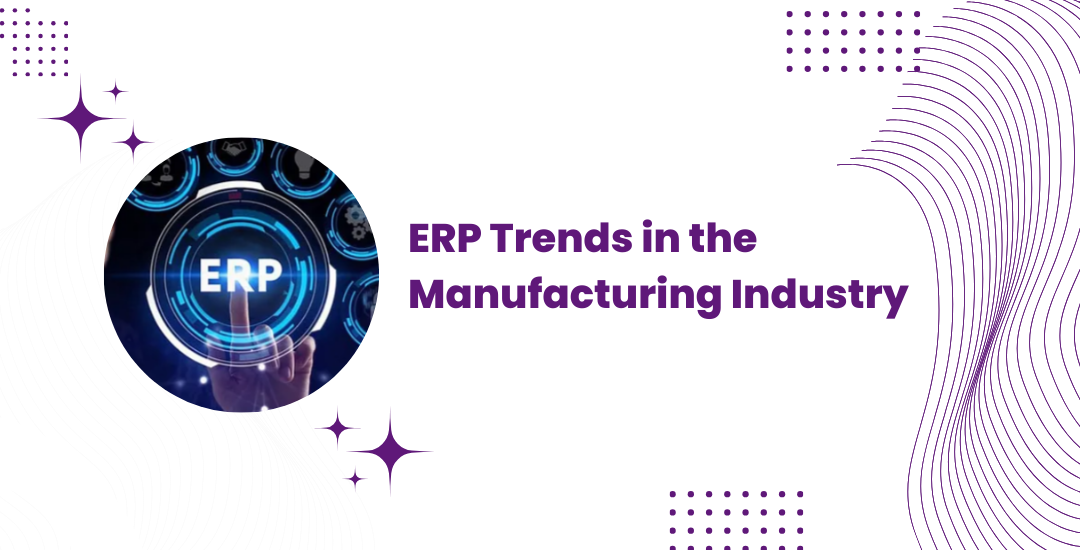Table of Contents
ToggleChoosing the Right ERP Software for Your Business
In manufacturing industry, staying ahead requires more than just keeping up with the latest trends—it demands a proactive approach to embrace innovation. As we venture into 2024 and beyond, the role of Enterprise Resource Planning (ERP) systems becomes increasingly pivotal in driving efficiency, agility, and competitiveness. In this article, we’ll explore 11 emerging ERP trends shaping the future of manufacturing, from multi-channel integration to the transformative potential of Industry 4.0.
11 ERP Trends in the Manufacturing Industry 2024:
1. Multi-Channel Integration
In today’s interconnected world, manufacturers are no longer confined to traditional sales channels. Multi-channel integration empowers them to seamlessly manage operations across various platforms, from e-commerce portals to brick-and-mortar stores. By consolidating data and streamlining processes, manufacturers can enhance customer experiences and adapt to shifting market dynamics with agility.
2. IoT-Driven Connectivity
The Internet of Things (IoT) is revolutionizing manufacturing by enabling unprecedented connectivity between machines, sensors, and ERP systems. Real-time data insights from IoT devices empower manufacturers to optimize production processes, predict maintenance needs, and minimize downtime. With IoT-driven connectivity, the factory floor transforms into a hub of intelligent decision-making, driving efficiency and productivity to new heights.
3. Cloud-Based Solutions
The era of on-premises ERP systems is giving way to cloud-based solutions, offering scalability, flexibility, and cost-effectiveness. Cloud ERP enables manufacturers to access critical data anytime, anywhere, fostering collaboration and agility across geographically dispersed teams. As cloud technology continues to mature, expect to see widespread adoption and innovation in cloud-based ERP solutions.
4. Focus on Sustainability
Sustainability is no longer a mere buzzword—it’s a business imperative for manufacturers. ERP systems are playing a crucial role in integrating sustainability into every aspect of operations, from supply chain management to resource utilization. By tracking environmental metrics, managing waste, and optimizing energy consumption, manufacturers can reduce their carbon footprint and contribute to a greener future.
5. Cybersecurity Measures
With the increasing digitization of manufacturing processes comes heightened cybersecurity risks. ERP systems are evolving to prioritize robust cybersecurity measures, safeguarding sensitive data from cyber threats and breaches. From encryption protocols to access controls, manufacturers must invest in comprehensive cybersecurity strategies to protect their digital assets and maintain trust with customers.
6. Remote Access from Anywhere
The rise of remote work is reshaping the manufacturing landscape, requiring ERP systems to support seamless remote access from anywhere. Whether it’s monitoring production metrics or approving orders on-the-go, manufacturers need ERP solutions that empower employees to stay connected and productive, regardless of their location.
7. Role of Artificial Intelligence (AI)
Artificial Intelligence (AI) is revolutionizing manufacturing by augmenting human capabilities and driving data-driven decision-making. ERP systems infused with AI algorithms can analyze vast amounts of data, uncover actionable insights, and automate repetitive tasks, freeing up human resources for more strategic endeavors. From demand forecasting to predictive maintenance, AI-powered ERP is paving the way for smarter, more efficient manufacturing operations.
8. Customization
One size does not fit all in manufacturing, which is why customization remains a key trend in ERP systems. Manufacturers require ERP solutions that can adapt to their unique workflows, business processes, and industry requirements. Whether it’s tailoring dashboards for specific user roles or integrating third-party applications, customizable ERP systems empower manufacturers to optimize operations according to their distinct needs.
9. Predictive Analytics
Predictive analytics is transforming manufacturing from reactive to proactive, enabling preemptive decision-making based on data-driven insights. By leveraging historical data and machine learning algorithms, ERP systems can forecast demand, identify potential bottlenecks, and optimize inventory levels. With predictive analytics, manufacturers can anticipate challenges before they arise, minimizing disruptions and maximizing efficiency.
10. Industry 4.0
Industry 4.0 represents a paradigm shift in manufacturing, characterized by the convergence of digital technologies and physical processes. ERP systems play a central role in driving the adoption of Industry 4.0 initiatives, such as digital twins, smart factories, and autonomous systems. By embracing Industry 4.0 principles, manufacturers can achieve unprecedented levels of automation, efficiency, and agility in their operations.
11. Mobile ERP
In an increasingly mobile-centric world, mobile ERP solutions are becoming indispensable for manufacturers on the move. Whether it’s accessing real-time data on the factory floor or approving purchase orders from a smartphone, mobile ERP empowers manufacturers to stay agile and responsive in a fast-paced environment. With intuitive mobile interfaces and offline capabilities, manufacturers can keep operations running smoothly, wherever they go.
The future awaits:
As we gaze into the future of manufacturing, one thing is clear: ERP systems will continue to be the backbone of operational excellence and innovation. By embracing these 11 ERP trends—from multi-channel integration to Industry 4.0—manufacturers can navigate the complexities of the modern landscape with confidence and foresight. The future of ERP is not just about keeping pace with change; it’s about leading the charge towards a more connected, sustainable, and intelligent manufacturing ecosystem.

